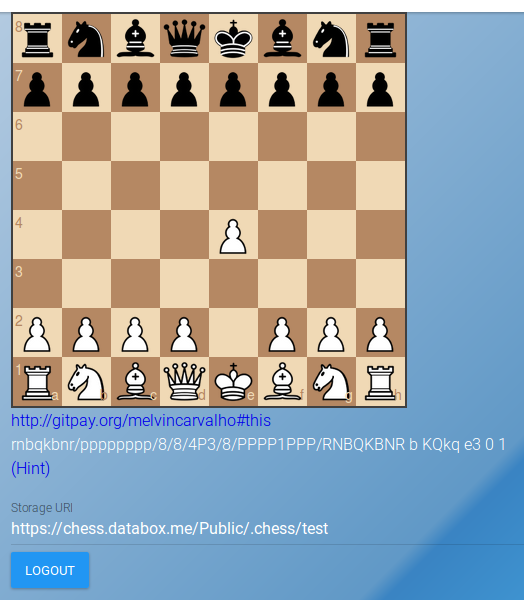In this tutorial we will cover how to play a game of chess in realtime using Solid and Websockets updates. A JavaScript board is embedded in the page, updates occur in realtime, and a link is provided to a chess engine to enable hints.
What you will learn
- How to add Websockets support
- How to send moves to a Pod in realtime
- How to update the board when a new move is made remotely
- How to create your own vocabulary
- How to embed a JavaScript chess widget in a page
- How to link to a chess engine for hints
The main aspect of this tutorial is realtime updates via Websockets. Solid uses a pub/sub mechanism to allow users to subscribe to a resource, and will send out updates when one of those resources changes.
Websockets are built into the browser, and are started using the:
new WebSocket(uri)syntax. After opening the socket, we then have access to the onopen,
onclose, onerror and onmessage functions. When a socket closes or errors,
we would like to restart it by calling a restart function.
socket.onerror = function(){
console.log('socket error');
setTimeout(connect, RECONNECT);
};After a socket has been opened, we will send a subscription to a resource:
socket.onopen = function(){
console.log(sub);
$scope.socket = socket;
socket.send('sub ' + sub, socket);
if (!quiet) {
setInterval(function() { socket.send('ping'); }, INTERVAL);
}
};Additionally, some web servers silently time out if not periodically pinged, so we will send a ping message every 4 minutes. If we get a message, we check for the 'pub' command and if found we will fire a callback for further processing.
socket.onmessage = function(msg) {
var a = msg.data.split(' ');
if (a[0] !== 'pub') return;
processSocket(a[1]);
};When we get a message, the server will tell us which resource updated. So we can now drop the cache, notify the user and fetch the resource again.
function processSocket(uri) {
$scope.invalidate(uri);
$scope.fetchBoard();
$scope.audio.play();
}More Coming soon ...
